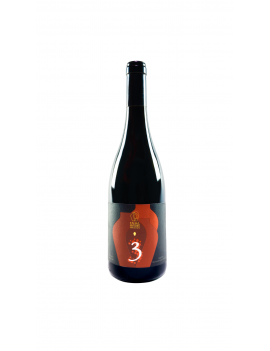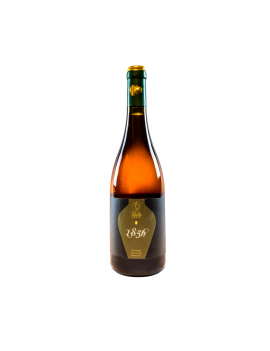
Wines
Our Wines:
During the hasrvest, the harvest is selected depending on each wine. The grapes are sent to our winery, where they are crushed and placed to ferment in the Talhas, together with a percentage of the solid parts (skin, pulp, grain and stalk), in a 100% natural process.
After a long fermentation, the wine remains with the solids until the end of January/ beginning of Feburary.
The wine is passed cleanly to another Talha, being only filtered, naturally by the solid parts deposited at the bottom of the Talha. The wine remains in the Talha to age for 5/6 months and is then bottle.
After bottling, it ages for 1 to 5 years in the bottle before being sold. We call these wines LONGA GUARDA (Long Age).
Subcategories
-
White
<p class="MsoNormal" style="line-height:normal;background:#ffffff;text-align:justify;"><b><span style="font-family:Arial, 'sans-serif';color:#000000;">White Talha Wines:</span></b></p> <p style="text-align:justify;"><span style="font-family:Arial, sans-serif;"><span style="background-color:#ffffff;">The vinification method for talha white wines is diffrent from the vinification method for so-called technological white wines. </span></span></p> <p style="text-align:justify;"><span style="font-family:Arial, sans-serif;"><span style="background-color:#ffffff;">Fermentation takes place while the liquid is in contact with the masses (skin, pulp, seeds and stems). In Talha wines, even after fermentation, the rules estabished by the CVRA only allow the wine to be separated from the masses after November 11th )the famous St. Martin's Day). </span></span></p> <p style="text-align:justify;"><span style="font-family:Arial, sans-serif;"><span style="background-color:#ffffff;">Fermentation in Talha takes longer due to the shape of the Talha itself, meaning there is longer contact with the masses, hence the great diffrence in color, textur and structure when compared to the so-colled tecnological whites. This prolonged contact also alows for greater extraction of phenolic compounds. This phenolic richness of Talha wines is much superior. </span></span></p> <p style="text-align:justify;"></p> -
Red
<p class="MsoNormal" style="line-height:normal;background:#ffffff;text-align:justify;"><b><span style="font-family:Arial, 'sans-serif';color:#000000;">White Talha Wines:</span></b></p> <p style="text-align:justify;"><span style="font-family:Arial, sans-serif;"><span style="background-color:#ffffff;">In red Talha wines, the winemaking method is most similar to the so-called technological red wines.</span></span></p> <p style="text-align:justify;"><span style="font-family:Arial, sans-serif;"><span style="background-color:#ffffff;">Fermentation takes place while the liquid is in contact with the masses (skin, pulp, seeds and stems). In Talha wines, even after fermentation, the rules estabished by the CVRA only allow the wine to be separated from the masses after November 11th )the famous St. Martin's Day).</span></span></p> <p style="text-align:justify;"><span style="font-family:Arial, sans-serif;"><span style="background-color:#ffffff;">Fermentation in Talha takes longer due to the shape of the Talha itself, meaning there is longer contact with the masses, hence the great diffrence in color, textur and structure when compared to the so-colled tecnological whites. This prolonged contact also alows for greater extraction of phenolic compounds. This phenolic richness of Talha wines is much superior. </span></span></p> <p style="text-align:justify;"></p>
Ermida de Santa...
From a vineyard around 40 years old, located near the Ermida de Santa Clara in Vidigueira, it...
€30.00
Price
3 2017
3 is the wine that best reflects the philosophy and missions of Talha de Frades. It is a...
€47.00
Price
Castas Antigas...
Produced from an old vineyard, around 40 years old. Composed of 7 grape varieties, the...
€42.00
Price
1856 2019
1856 is the date of the Talha where this wine aged for 5 months before being bottled.
It is a...
€26.00
Price
Vale Palheiro 2019
Vale Palheiro is the place where the wineyard is planted, close to the ruins of S. Cucufate....
€24.00
Price
Millennial 2022
Produced from a young 5-year-old vineyard, located near the ruins of S. Cucufate, in Vila de...
€19.00
Price
1x1 2018
From a vineyard that is around 20 years old, this wine was born from a mistake during the...
€25.00
Price
Castas Antigas...
White wines are almost exclusive here.
We have a vineyard in the S. Cucufate area about 40...
€47.00
Price


















